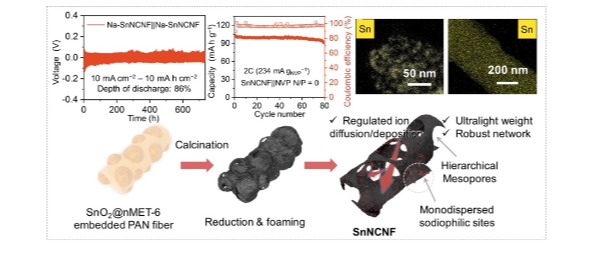《Space-Confined Guest Synthesis to Fabricate Sn-monodispersed N-doped Mesoporous Host toward Anode-Free Na Batteries》
The practical application of high-energy-density sodium metal batteries has been constrained by problems such as large volume changes and easy dendrite growth. In this work, we developed a strategy for in-situ pore confined reaction, using metal-organic framework materials as nanoreactors and pore-making agents to synthesize a nitrogen-doped mesoporous carbon fiber substrate SnNCNF with monodisperse Sn clusters for reversible deposition exfoliation of sodium metal. The hybrid substrate exhibits excellent natriphilic activity, fast Na adsorption, and ultra-low nucleation overpotential (2 mV). Its porous structure ensures uniform Na deposition and extremely high Na capacity. In addition, the substrate achieves more than 2000 reversible cycles and an average coulombic efficiency of up to 99.96% (3 mA cm−2 and 3 mA h cm−2) in half-cell deposition stripping experiments. The Na-SnNCNF anode perfused by the melt method achieves 86% Na utilization rate (10 mA cm−2 and 10 mA h cm−2) in symmetrical cell testing, and the Na-SnNCNF||The Na3V2(PO4)3 showed excellent rate performance and cycle life (more than 1000 turns at 1 A g−1 current, 92.1% capacity retention) in the whole cell test. Furthermore, high-energy-density/power-density low-anode/non-anode Na batteries have also been successfully assembled. This work provides an efficient heteroatom doping strategy for the assembly of multifunctional porous carbon materials and the development of high-performance metal batteries.

https://onlinelibrary.wiley.com/doi/abs/10.1002/adma.202301967
